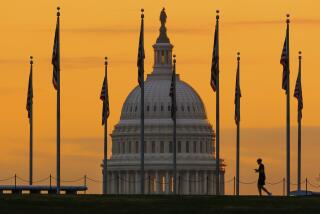General Public ‘Knows’ What Should Be Done : Policy: A new study has found that people depend a lot more on the opinions of their fellow citizens than on all other outside influences.
- Share via
WASHINGTON — An issue--health care, the deficit, violence on the streets, free trade with Mexico--comes up. Politicians offer proposals. Interest groups--doctors, businessmen, gun lobbyists, unions--weigh in, trying to win the public over to their side.
But, according to new research, the public has its own independent way of determining what government should do about society’s problems.
The key findings: People depend a lot more than politicians suspect on the opinions of their fellow citizens in forming their judgments; they are motivated by self-interest, but those interests go beyond the obvious what’s-in-it-for-me question; they are reluctant to pick sides in the first stages of a public debate, preferring first to ask questions, discuss the issue, test ideas and gain confidence in their own views.
And, the researchers conclude, people depend, more than seems obvious, on little-noticed meeting places--places of worship, libraries, community halls--where they can interact with others, offer their own thinking and become committed to, and sometimes engaged in, the solution.
These places are becoming fewer, the researchers said, but they are vital to the process.
The findings were published recently by the Kettering Foundation, a nonprofit organization that hired a Bethesda, Md., research organization, the Harwood Group, to conduct group discussions with involved citizens.
Politicians, special interests and the press have only limited roles in forming public opinion, the report said; exchanges among ordinary people play a bigger role.
“The public teaches itself through an interactive dialogue, not a debate--a dialogue that is exploratory and deliberative with people testing their ideas rather than taking positions and trying to score points against some opponent,” said Kettering President David Mathews, who was secretary of health, education and welfare in the Gerald R. Ford Administration.
“This dialogue is full of emotion because it is grounded in often painful personal experiences, yet it doesn’t have the acrimony or ideological tilt of partisan debate.”
The researchers concluded that in forming public opinion:
* People get involved when an issue is relevant to their own experience.
They cited a Los Angeles man who worked to help the homeless because he had lived in some of his city’s tough neighborhoods. A Richmond, Va., woman said she helped teach literacy because she had graduated from high school with people who could not read.
* Emotion plays an important role. Emotion is often portrayed as a villain in decision making, but that is not the way the world works, the researchers said.
* Facts and statistics are less important to the way people take stands than whether solutions “ring true.”
“The citizens we interviewed have their own internal touchstones for judging what rings true, what makes sense to them,” the report said. “Their judgments about what is authentic have less to do with objective proofs than if something or someone reflects the realities of their lives, or if they can make something possible to imagine, or if they feel they are being squared with.”
* The catalysts that drive people to get involved are often other ordinary citizens who have had some contact with the issue and seem to know something about it.
As an example of what can happen without public involvement, Mathews pointed to the legislation to expand Medicare to pay for catastrophic illnesses, enacted in 1988 and repealed the following year when Medicare recipients learned their taxes would rise.
It was a classic instance, he said, in which those operating in Washington reached agreement before the public had a chance to become engaged, think about the trade-offs and talk to one another.
The public wants time to mull things over, he said.





